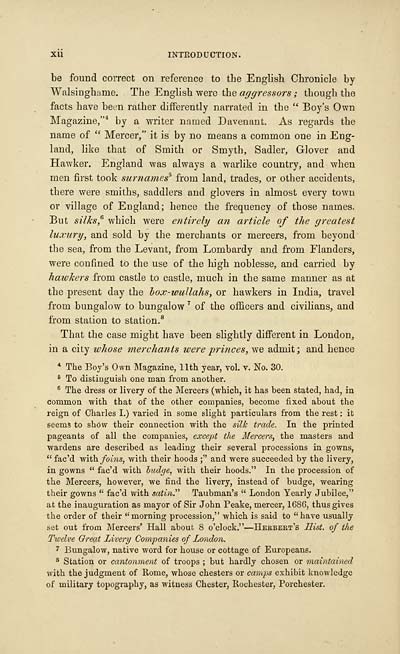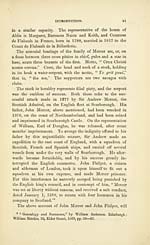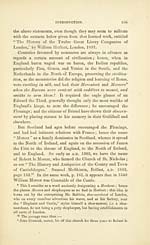Mercer Chronicle
(16) Page xii
Download files
Complete book:
Individual page:
Thumbnail gallery: Grid view | List view

XII INTRODUCTION.
be found correct on reference to the English Chronicle by
Walsinghame. The English were the aggressors ; though the
facts have been rather differently narrated in the " Boy's Own
Magazine," 4 by a writer named Davenant. As regards the
name of " Mercer," it is by no means a common one in Eng-
land, like that of Smith or Smyth, Sadler, Glover and
Hawker. England was always a warlike country, and when
men first took surnames' from land, trades, or other accidents,
there were smiths, saddlers and glovers in almost every town
or village of England; hence the frequency of those names.
But silks, 6 which were entirely an article of the greatest
luxury, and sold by the merchants or mercers, from beyond
the sea, from the Levant, from Lombardy and from Flanders,
were confined to the use of the high noblesse, and carried by
hawkers from castle to castle, much in the same manner as at
the present day the box-wuUahs, or hawkers in India, travel
from bungalow to bungalow 7 of the officers and civilians, and
from station to station. 8
That the case might have been slightly different in London,
in a city whose merchants were princes, we admit; and hence
* The Boy's Own Magazine, 11th year, vol. v. No. 30.
6 To distinguish one man from another.
c The dress or livery of the Mercers (which, it has been stated, had, in
common with that of the other companies, become fixed about the
reign of Charles I.) varied in some slight particulars from the rest : it
seems to show their connection with the silk trade. In the printed
pageants of all the companies, except the Mercers, the masters and
wardens are described as leading their several processions in gowns,
" fac'd with foins, with their hoods ;" and were succeeded by the livery,
in gowns " fac'd with budge, with their hoods." In the procession of
the Mercers, however, we find the livery, instead of budge, wearing
their gowns " fac'd with satin." Taubman's " London Yearly Jubilee,"
at the inauguration as mayor of Sir John Peake, mercer, 1686, thus gives
the order of their "morning procession," which is said to "have usually
set out from Mercers' Hall about 8 o'clock." — Herbert's Hist, of the
Twelve Or eat Livery Companies of London.
7 Bungalow, native word for house or cottage of Europeans.
8 Station or cantonment of troops ; but hardly chosen or maintained
with the judgment of Rome, whose chesters or camps exhibit knowledge
of military topography, as witness Chester, Rochester, Porchester.
be found correct on reference to the English Chronicle by
Walsinghame. The English were the aggressors ; though the
facts have been rather differently narrated in the " Boy's Own
Magazine," 4 by a writer named Davenant. As regards the
name of " Mercer," it is by no means a common one in Eng-
land, like that of Smith or Smyth, Sadler, Glover and
Hawker. England was always a warlike country, and when
men first took surnames' from land, trades, or other accidents,
there were smiths, saddlers and glovers in almost every town
or village of England; hence the frequency of those names.
But silks, 6 which were entirely an article of the greatest
luxury, and sold by the merchants or mercers, from beyond
the sea, from the Levant, from Lombardy and from Flanders,
were confined to the use of the high noblesse, and carried by
hawkers from castle to castle, much in the same manner as at
the present day the box-wuUahs, or hawkers in India, travel
from bungalow to bungalow 7 of the officers and civilians, and
from station to station. 8
That the case might have been slightly different in London,
in a city whose merchants were princes, we admit; and hence
* The Boy's Own Magazine, 11th year, vol. v. No. 30.
6 To distinguish one man from another.
c The dress or livery of the Mercers (which, it has been stated, had, in
common with that of the other companies, become fixed about the
reign of Charles I.) varied in some slight particulars from the rest : it
seems to show their connection with the silk trade. In the printed
pageants of all the companies, except the Mercers, the masters and
wardens are described as leading their several processions in gowns,
" fac'd with foins, with their hoods ;" and were succeeded by the livery,
in gowns " fac'd with budge, with their hoods." In the procession of
the Mercers, however, we find the livery, instead of budge, wearing
their gowns " fac'd with satin." Taubman's " London Yearly Jubilee,"
at the inauguration as mayor of Sir John Peake, mercer, 1686, thus gives
the order of their "morning procession," which is said to "have usually
set out from Mercers' Hall about 8 o'clock." — Herbert's Hist, of the
Twelve Or eat Livery Companies of London.
7 Bungalow, native word for house or cottage of Europeans.
8 Station or cantonment of troops ; but hardly chosen or maintained
with the judgment of Rome, whose chesters or camps exhibit knowledge
of military topography, as witness Chester, Rochester, Porchester.
Set display mode to:
![]() Universal Viewer |
Universal Viewer | ![]() Mirador |
Large image | Transcription
Mirador |
Large image | Transcription
Images and transcriptions on this page, including medium image downloads, may be used under the Creative Commons Attribution 4.0 International Licence unless otherwise stated. ![]()
| Histories of Scottish families > Mercer Chronicle > (16) Page xii |
|---|
| Permanent URL | https://digital.nls.uk/94860466 |
|---|
| Description | A selection of almost 400 printed items relating to the history of Scottish families, mostly dating from the 19th and early 20th centuries. Includes memoirs, genealogies and clan histories, with a few produced by emigrant families. The earliest family history goes back to AD 916. |
|---|

